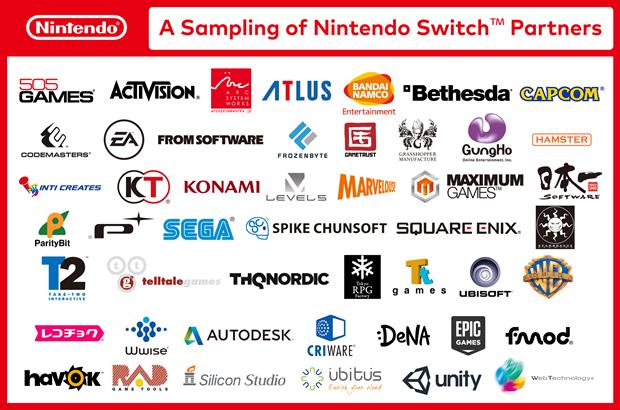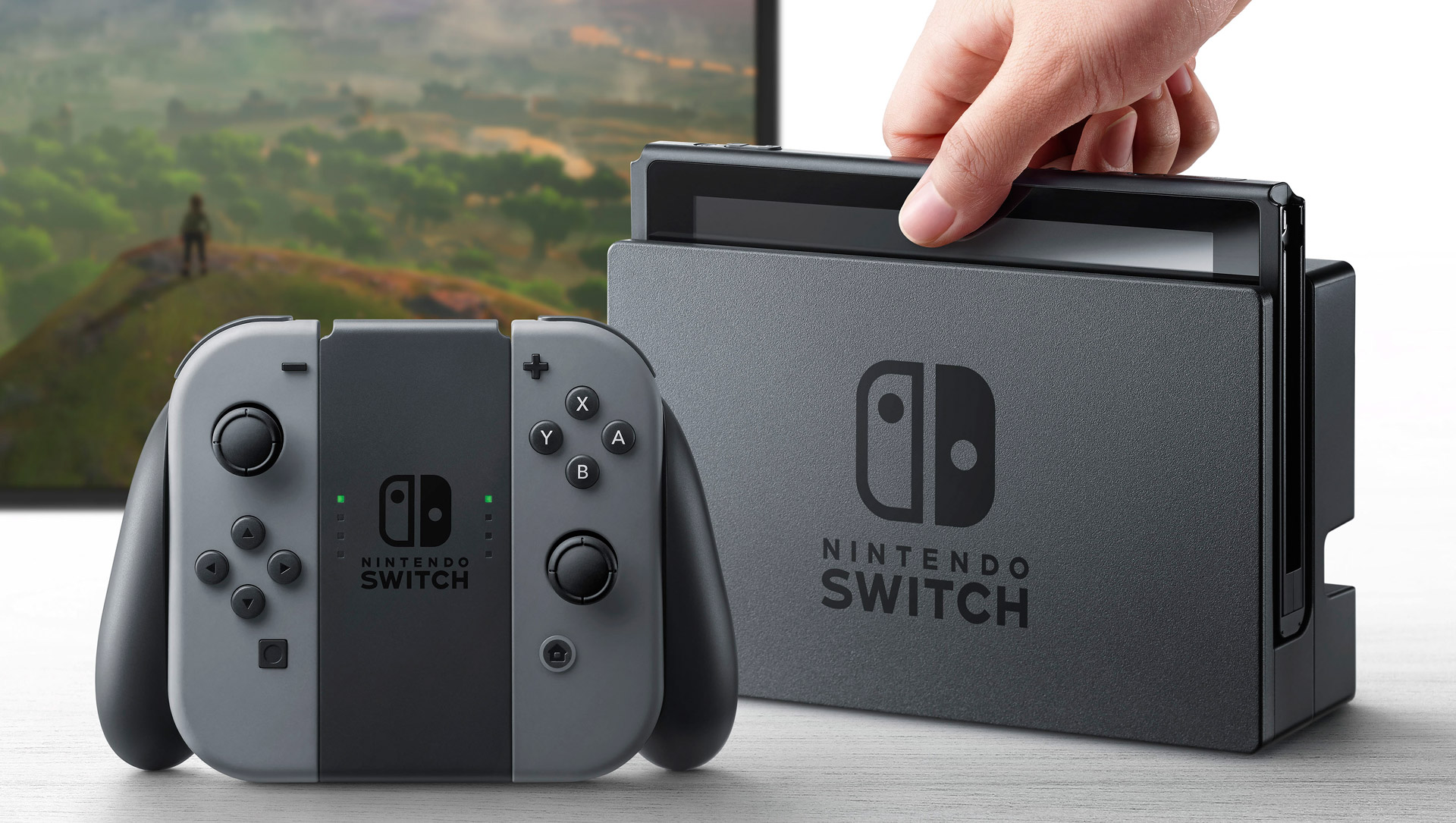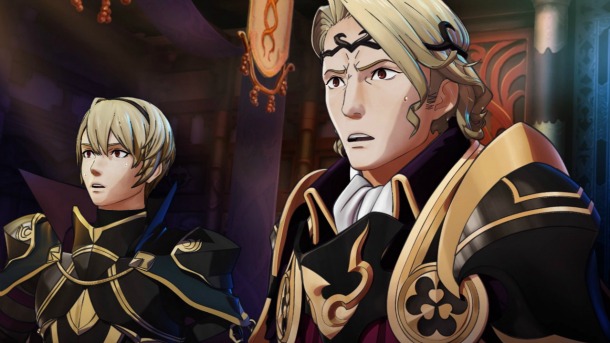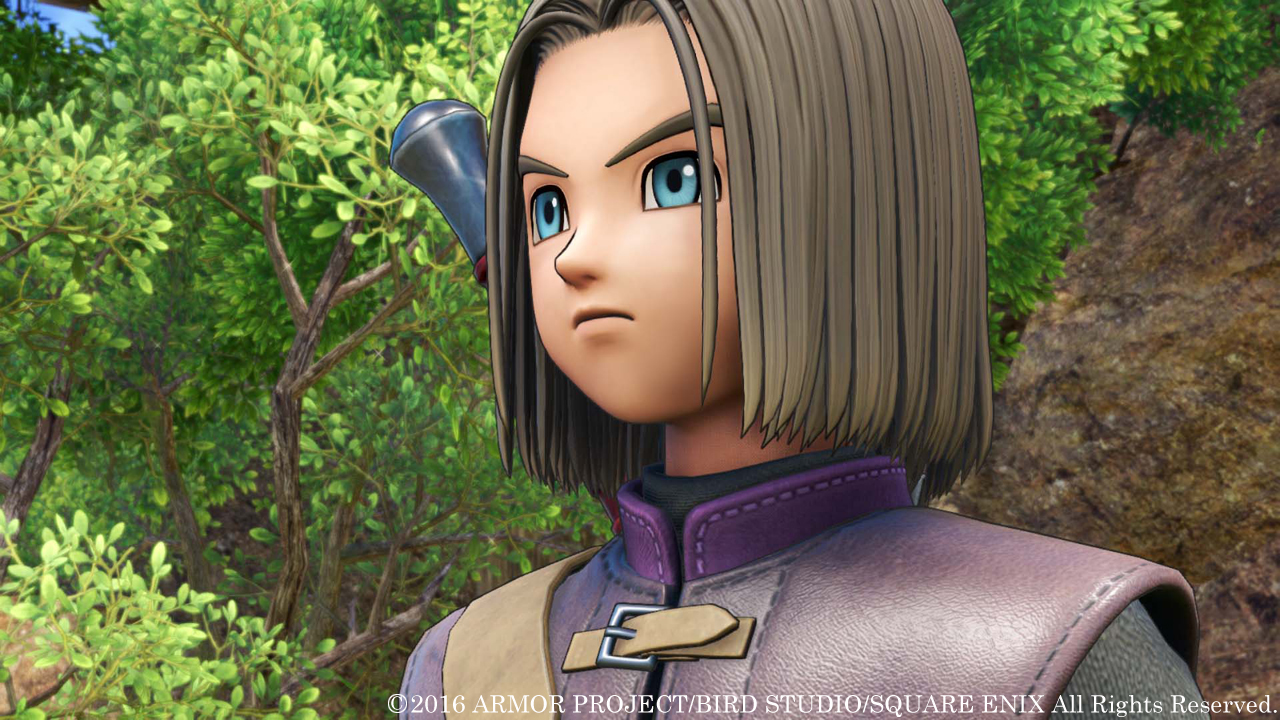
We’re less than a week away from the full blowout on the Nintendo Switch. Nintendo’s upcoming machine has already caught the imaginations of everybody, thanks to an effective three minute video debuting the system and its central concept that Nintendo released back in October, but the conversation around the Switch has been as much about what we don’t know about it as it has been about what we do. Notably, as is always the case with a new system, a lot of people are once again caught up in discussions of whether or not Nintendo’s newest machine will be as powerful as competing systems, pooh-poohing it prematurely every time a rumor says it won’t be, being skeptical every time a rumor says it might be.
But honestly, the specs discussion is probably missing the point when it comes to the Nintendo Switch. More than any other game system before, the Nintendo Switch is unlikely to be defined or limited by hard numbers and raw hardware power. The Switch is billing on selling itself as a machine that caters to you and your lifestyle- a machine that adapts itself for you, that becomes whatever you need it to be, so that you can continue playing games, so that nothing gets in the way of you playing, as, when, and how you want to play. It is entirely unlike other systems on the market, with their install times, updates, loading, and so on. You simply pop in your cartridge, and you’re good to go- no matter where in the world you are.
But the power argument- we keep coming back to the power argument (as if the system’s ability to output in 4K matters on its 6 inch screen). I don’t want to even get into the principles of discussing hardware specs- as mid cycle upgrades like the PS4 Pro have shown us, better specs might lead to prettier games, but don’t mean anything for gameplay. And as games like Rocket League and Minecraft have shown us, very often, the best games don’t need cutting edge tech- just enough power that their vision is not compromised. No, specs in and of themselves are not the problem- the problem would be what they mean for third party support.
"The specs discussion is probably missing the point when it comes to the Nintendo Switch. More than any other game system before, the Nintendo Switch is unlikely to be defined or limited by hard numbers and raw hardware power."
The Switch, by all accounts, is more powerful than the Wii U, which means it is also more powerful than the Xbox 360 and PS3. It is, however, less powerful than the Xbox One (and so naturally the PS4 as well). It is probably closer to the Xbox One than it is the Wii U, but that is a moot point- the fact remains that it’s weaker than the weakest console of the generation so far, the one that third parties probably target as the lowest common denominator. This is a problem, right?
In the past, this has led to catastrophic exoduses of third parties from Nintendo’s systems- the Wii and Wii U both saw third party support dry up, because they were too weak to run games that the Xbox 360/PS3 and Xbox One/PS4 were running, and it was too much bother scaling games down to run on them. In turn, this led to a dearth of good games on the systems, as well as the infamous droughts that are now almost synonymous with Nintendo. Why, then, should we believe the Switch will be any different?
If the primary argument that one wishes to make when discussing specs is this shortage of games on Nintendo systems, then there are many reasons why the Switch will not have the same problems that the Wii and Wii U did. The most obvious one is that the Switch is the first time that Nintendo will be able to give their undivided attention to one system- in the past, their attention has always been split between their handhelds and their consoles, and as handheld games have grown more complex, as console games have transitioned into HD development, and as Nintendo have found the need to prop up their tapering handheld sales themselves with the full force of their development talent, their games have always ended up split up between two systems. Nintendo are among the most prolific game companies in the world, and easily put out over a dozen games a year- but split between two systems, that comes to one game every two months. If you own a Wii U, a game every two months is pretty dismal, especially with no third party support.
With the Switch, all Nintendo games are going to be on one system. You will not have to sit and watch as your handheld brethren get the latest Fire Emblem or Pokemon game- you will be getting those games yourself. By itself, this directly tackles the issue of droughts and game shortages on Nintendo systems. The Switch’s status as a hybrid of, and successor to, Nintendo’s handheld and console hardware lines has another great benefit- all the great third party support that Nintendo have enjoyed on their handhelds, games like Monster Hunter, Professor Layton, Shin Megami Tensei, Yokai Watch, Dragon Quest, all of that will make it over to the Switch, too.
"With the Switch, all Nintendo games are going to be on one system. You will not have to sit and watch as your handheld brethren get the latest Fire Emblem or Pokemon game- you will be getting those games yourself. By itself, this directly tackles the issue of droughts and game shortages on Nintendo systems."
But of course, this isn’t enough in and of itself- while it ensures that you won’t be unhappy with a Nintendo game system purchase, it also ensures that you won’t be purchasing a Nintendo game system as your primary- not unless you want to miss the latest Elder Scrolls, Assassin’s Creed, or Call of Duty. Which brings us back to the question of third party support, especially console scale third party support.
This is where things get interesting- a while ago, I predicted that the Switch (then known only as the NX) would basically become the Japanese equivalent of the Xbox as far as third party support goes– just as Xbox gets 100% of western third party support, and some, but not extensive, Japanese third party support, so the Switch will get 100% of Japanese third party support, and some, but not extensive, western third party support. At least a part of this statement looks to be true- the 3DS, Wii U, and Vita are all winding down in Japan, and the PS4 alone isn’t performing well enough for publishers to make up for domestic revenues and sales that they otherwise stand to lose. The Nintendo Switch, which gives Japan, a country that has always gravitated to portables more than consoles, a literal portable console, is likely to appeal to Japanese demographics- meaning Japanese third parties are likely to support the system.
We’ve already seen early indications of it. Square Enix have already confirmed Dragon Quest 11 for the system, and have also discussed bringing Final Fantasy to it in the last. Japanese third parties like Sega, Capcom, Atlus, From Software, and Level-5 have all openly pledged support for the system. In the future, one should not be surprised if most Japanese games are announced for the PS4 and Switch- just as most western games are currently announced for PS4 and Xbox One. The Switch can become a haven for Japanese games, with titles like Tales, Tekken, Persona, Dragon Quest, Monster Hunter, Kingdom Hearts, Resident Evil, Dark Souls, and more all finding a home for it. If your primary interest in gaming is in Japanese games, it is very likely that you will be able to do with just a Switch in the future- the entirety of the Japanese gaming industry will be united behind it, along with Nintendo. Nintendo have already shown the ability to court and retain Japanese third party support in the past- even when western third parties were abandoning the Gamecube and Wii, we were getting games like Viewtiful Joe, Resident Evil 4, Tales of Symphonia, Monster Hunter 3, and Skies of Arcadia on them. Nintendo can provide Japanese third parties, displaced by the sudden void left by the death of the 3DS and Vita, with no handheld to go to, and by the massive expenses that PS4 game development incurs, a home- a home that they are likely to gratefully flock to.
Japanese third parties are not the only third parties Nintendo have shown an ability to work with, either- there is one other, very important segment of third party developers that Nintendo been silently working with and courting over the last few years, a segment of developers who have shown themselves to be all too enthusiastic to support Nintendo- indie game developers.
"Nintendo can provide Japanese third parties, displaced by the sudden void left by the death of the 3DS and Vita, with no handheld to go to, and by the massive expenses that PS4 game development incurs, a home- a home that they are likely to gratefully flock to."
The importance of this cannot be overstated- with AAA game development taking years upon years per game now, the bulk of third party support that modern systems get is from indie developers. The Xbox One has half the number of games the PS4 does- because the PS4 has courted the indie game community that much more successfully. The 3DS, in spite of being so successful, still doesn’t have as many games as the Vita does, simply because the Vita is a bigger hit with indie developers.
Indie developers have also delivered some of the most outstanding hits of the last few years- The Talos Principle, Inside, ARK: Survival Evolved, Shovel Knight, We Happy Few, Furi, The Witness, the upcoming Rime, and of course, Rocket League, are all games from independent game developers, which struck a chord with mainstream audiences. The fact, then, that Nintendo are able to work with indie game developers, and secure the bulk of it for their systems, is an extremely important asset- especially when you consider that working with the Wii U and 3DS, Nintendo was hindered by the 3DS’s inability to run most modern game engines, including Unity (the one that most indie game developers use), the Wii U’s install base (which makes it unappealing for indie game developers), and the Wii U’s own problems running Unity and other modern game engines. The fact, then, that Nintendo managed to garner as much notable indie game support for the Wii U especially as they did, and that so many successful indie hits, like Shovel Knight and Steamworld Dig, managed to find a bigger fanbase on Nintendo systems than on other systems, speaks volumes.
So yes, between indie games, Japanese games, handheld games, and Nintendo’s own games, the Switch is really unlikely to actually see a lack of games for one to play- a Switch owner is unlikely to ever find themselves wanting for games. But okay, let’s address the elephant in the room, as well- you care more about western third party support than you do about any of this. If you can’t be assured that Activision or EA are on board, then why bother with the system?
"That Nintendo are able to work with indie game developers, and secure the bulk of it for their systems, is an extremely important asset."
It’s an important question, but it is also one that has been answered already- all western third parties, such as Activision, Ubisoft, Warner Bros., and even EA and Take 2 (the folks who bring us XCOM, Bioshock, GTA, and Red Dead) have already pledged support for Nintendo’s system. But, I hear you say, we heard similar things before the Wii U’s launch- and look how that turned out!
In this case, I would contend that you remember wrong. Not only was the Wii U’s list of third party support dismal (you can check it here– compare this to the Switch’s, and tell me for yourself how it holds up), but the general sentiment towards the Wii U in the lead up to its launch was outright contempt- does anyone remember Epic Games’ executives laughing uproariously when Wii U support was brought up in an interview? Contrast that to the Switch, where we have seen western third parties be openly enthusiastic about the Switch and its prospects, or at the very worst, be cautious, but still on board- it’s a world of a difference.
But, you ask me, trying to return to the original question- just how long will these third parties actually bother to support a weak Nintendo Switch, especially with the just released PS4 Pro, and the launch of the Xbox One Scorpio on the horizon? Why would they even bother to do that in the long run? Wouldn’t the Switch run into the same problem that the Wii and Wii U did, where it was too much effort to get games running on them, leading to third parties passing on putting their titles on the system?

"All western third parties, such as Activision, Ubisoft, Warner Bros., and even EA and Take 2 (the folks who bring us XCOM, Bioshock, GTA, and Red Dead) have already pledged support for Nintendo’s system."
And this is where my original thesis comes into play- no, hard specs will not matter here. The Nintendo Switch is using a state of the art development environment provided by Nvidia, to facilitate easy ports from Xbox One and PS4; it crosses the minimum threshold necessary to run most modern AAA games; most modern development pipelines and game engines are scalable all the way down to smartphones and tablets, and up to the most powerful PCs, including Unreal, Crytek, and Frostbite (EA in particular take great pride in Frostbite’s scalability, and how that will help them with new hardware in the future)- and no matter how weak you think the Switch might be, you know it is more powerful than smartphones and tablets. Modern middleware and assets only need to be scaled down, which requires little effort, to be put on Switch, as opposed to the case with Wii and Wii U, where developers had to redo their games in an entirely separate pipeline, to account not only for those console’s weaker power, but also their entirely different development environments. In other words, even with AAA games, there is very little about the Switch’s specs that should stop third parties from supporting the system.
Does this mean that I anticipate the Switch to get all AAA western third party games? Oh, goodness no- I know, for instance, that the Switch won’t get games like Mass Effect Andromeda, which it is too late for, or Red Dead Redemption 2, where the demographics of the Switch audience have not yet been proven. But I feel reasonably positive in suggesting that Batman, Assassin’s Creed, Call of Duty, Destiny, The Elder Scrolls, Far Cry, Beyond Good and Evil– these are all western AAA games that the Switch will get.
Actually, I think this is a good analog for how I think the state of third party support on the Switch will be. Will it get all indie games? No, it will not. Will it get all Japanese games? No, it will not. Will it get all handheld third party games? No, it will not. Will it get all AAA games? No, it will not. But I think it will get just enough in each category to make the Switch a viable, alluring prospect- enough western third party games, enough Japanese third party games, enough handheld third party games, enough indie games, that, put together with Nintendo games, the Switch will become a bustling, healthy ecosystem of games, a third pillar to stand aside PC gaming, and Xbox/PlayStation. And unlike the Xbox/PlayStation, the Switch may even be able to deliver experiences across the full spectrum of games- AAA titles, mid sized games, bit sized games, full priced games, budget priced games, indie games, everything. That is something that has been lost on modern consoles, and something that Nintendo could be in a unique position to cultivate on the Switch.
"The Switch may even be able to deliver experiences across the full spectrum of games- AAA titles, mid sized games, bit sized games, full priced games, budget priced games, indie games, everything. That is something that has been lost on modern consoles, and something that Nintendo could be in a unique position to cultivate on the Switch."
So sure, in terms of hard specs, the Switch might be weaker than the PS4 and Xbox One. But chances are, that won’t matter. If you look at the specs as a means to an end, the end being games to play, and are worried about the Switch’s specs because you are worried you might not get enough games to play- well, don’t. As I’ve discussed at length here, that shouldn’t be much of a problem. On the other hand, if you’re more interested in pixel counting, and arguing resolutions, then yeah, there’s no getting around the Switch’s probable weakness over the Xbox One and PS4- but in that case, the Switch is also not likely to be a console for you, and you should probably stop concerning yourself with it, and focus on the consoles that can give you what you do enjoy.
Note: The views expressed in this article are those of the author and do not necessarily represent the views of, and should not be attributed to, GamingBolt as an organization.


















